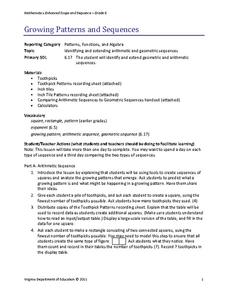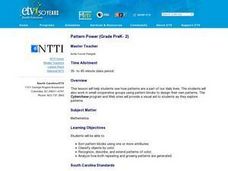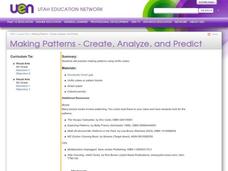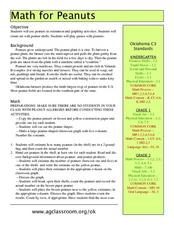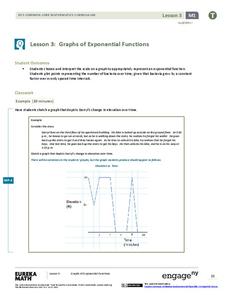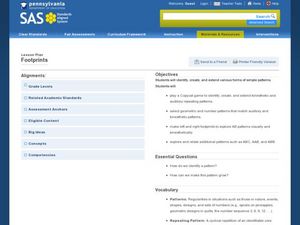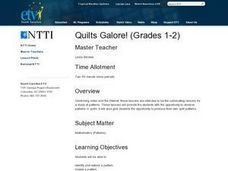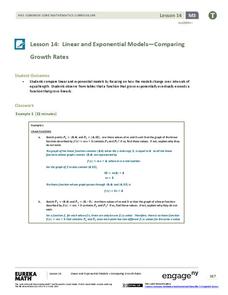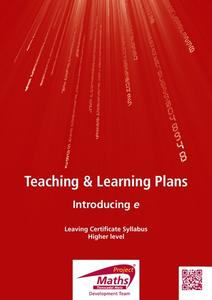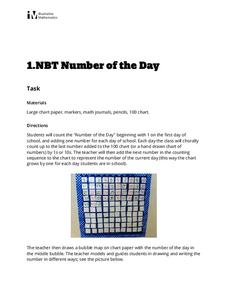Utah Education Network (UEN)
Mathematics: Growing Patterns
Learners graph growing patterns using ordered pairs on a coordinate grid. They read The Fly on the Ceiling, a Math Myth.
Virginia Department of Education
Growing Patterns and Sequences
Learners explore, discover, compare, and contrast arithmetic and geometric sequences in this collaborative, hands-on activity. They build and analyze growing patterns to distinguish which kind of sequence is represented by a set of data...
Curated OER
Pattern Power
Young elementary students will discover there are patterns all around them in their daily lives. In groups, they sort pattern blocks by size and color. Using the internet, they create their own type of patterns and share them with the...
Curated OER
Creating, Describing, and Analyzing Patterns
Students investigate patterns. In this kindergarten through second grade mathematics lesson, students use patterns to analyze relationships and make predictions. Students use an interactive math applet to investigate repeating and...
Curated OER
Making Patterns - Create, Analyze, and Predict
Fourth graders practice making patterns using Unifix cubes and identify, analyze, and determine rules for describing numerical patterns involving operations and nonnumerical growing patterns. They also find an example of a pattern in...
Oklahoma State University
Math for Peanuts
Peanuts! Get your peanuts! Kids explore math, art, and agriculture concepts focused on peanuts. There is a brief informational text to get them started, and you'll find definitions of five in-text vocabulary words to address. Kids...
Curated OER
Patterns
Fourth graders investigate patterns and sequences. In this patterns and sequences lesson, 4th graders use a hundreds chart to build recurring patterns. Students skip count by threes and fives on a hundreds chart by coloring multiples...
EngageNY
Graphs of Exponential Functions
What does an exponential pattern look like in real life? After viewing a video of the population growth of bacteria, learners use the real-life scenario to collect data and graph the result. Their conclusion should be a new type of graph...
EngageNY
Why Do Banks Pay YOU to Provide Their Services?
How does a bank make money? That is the question at the based of a instructional activity that explores the methods banks use to calculate interest. Groups compare the linear simple interest pattern with the exponential compound interest...
EngageNY
Nonlinear Models in a Data Context
How well does your garden grow? Model the growth of dahlias with nonlinear functions. In the lesson, scholars build on their understanding of mathematical models with nonlinear models. They look at dahlias growing in compost and...
Curated OER
Investigation - Patterns
Students create a pattern out of pattern blocks. In this math instructional activity, students work with a partner to investigate the pattern they have. Within that group, students continue to design the pattern by adding the next two...
Curated OER
How Does Your Garden Grow?
Young scholars construct and maintain a school garden. In this gardening lesson, students plan the construction of the garden by writing letters to local businesses asking for supplies and materials; young scholars build the garden using...
Curated OER
It Just Keeps Going and Going...
Students explore patterns, identify patterns, and complete a variety of patterns. They view and discuss an online video and identify the different patterns from the film, then using a hundreds grid create an original pattern using their...
Curated OER
All A-buzz About Math
Second graders participate in Math-Eze activities to comprehend word problems. For this word problem lesson, 2nd graders recognize why a hexagon is the best shape for a beehive. Students calculate how far bees must travel to find 2 lbs....
Curated OER
Footprints
Students explore patterns. In this patterns geometry instructional activity, students identify and extend patterns including body parts, movement, geometric shapes, noises, and footprints. Students create and share an original pattern.
Curated OER
Be Sharp and Never Flat
An outstanding lesson on music awaits your young composers! They learn about patterns found in music, the different sections of an orchestra, and see the differences between musicians and a composer. Excellent streamed videos and good...
Curated OER
Quilts Galore
Students explore patterns. They observe a video, "Math Monsters." Students determine the next item in a sequence. Students read books about patterns. They discuss patterns in quilts. Students visit a specified web site and design...
EngageNY
Linear and Exponential Models—Comparing Growth Rates
Does a linear or exponential model fit the data better? Guide your class through an exploration to answer this question. Pupils create an exponential and linear model for a data set and draw conclusions, based on predictions and the...
Project Maths
Introduction to e
First there was pi and now there's e. A discovery-based lesson helps learners find a pattern in compound interest as the compounding period changes. Their investigation results in the discovery of the number e. The lesson is the first in...
Illustrative Mathematics
Number of the Day
Daily routines not only help to manage classrooms, they can also provide students with rich opportunities for learning. This activity supports young learners in developing their number sense by counting up the school days on a class 100...
Curated OER
Equal Differences Over Equal Intervals 2
Your algebra learners explore linear functions concretely using tables of values in a collaborative task. The idea that linear function values change by equal differences over equal intervals, is emphasized. The slope and y-intercept...
Curated OER
Equal Differences Over Equal Intervals 1
Learners explore linear functions concretely using tables of values in a cooperative task. The concept of the values of linear functions changing by equal differences over equal intervals of one is emphasized. Learners will discover the...
Curated OER
Lesson: Younger Than Jesus: Understanding, Looking at, Making Abstract Art
Before the class makes abstract art, they see contemporary examples and analyze them. They look at art made by abstract artists under the age of 33 then use similar techniques to create an interesting collection of their own. The lesson...
Curated OER
What's the Best Deal?
Students explore number sense by solving consumer math problems. For this pattern identification lesson, students analyze a list of numerical and geometric patterns while predicting the future outcome. Students utilize inference skills...



